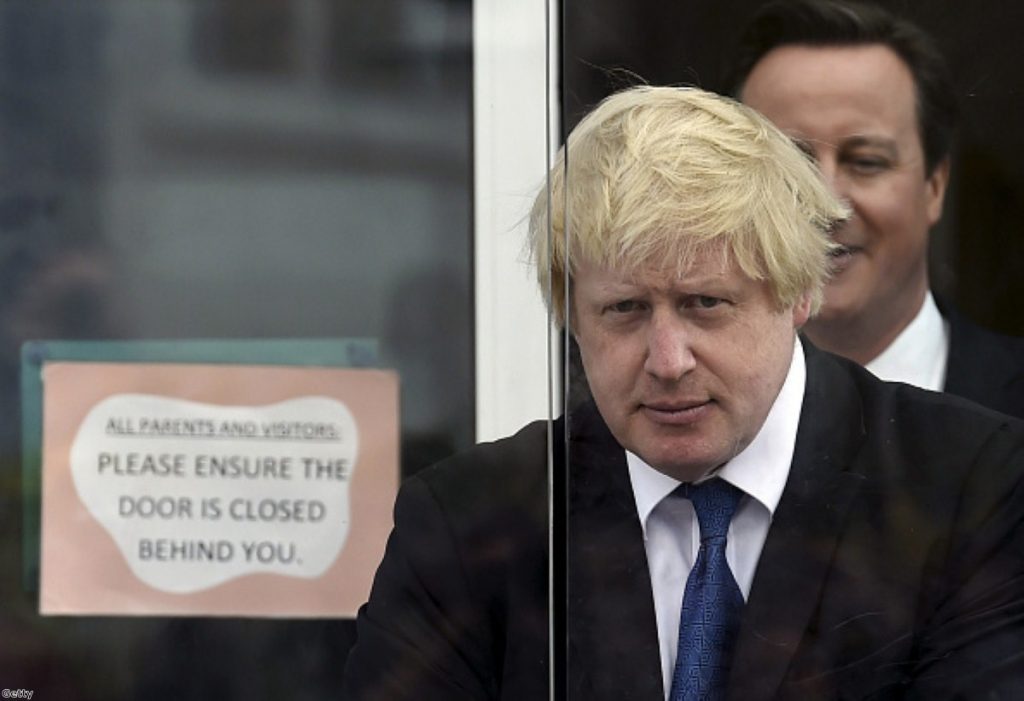Boris Johnson’s row with Ed Miliband reveals his darker side
Boris Johnson's performance against Ed Miliband on the Andrew Marr sofa could go down in history as the moment he threw away his best chance of becoming Conservative party leader and prime minister.
Before he sat down, Johnson was the solid favourite to succeed Cameron. With the polls showing Miliband heading to Downing Street, both senior MPs and party donors had begun briefing that Boris should be quickly installed after May 8th. The 'Boris for leader' campaign had been quickly gathering momentum, with one new poll even suggesting Johnson would give his party a significant bump, should he take over. These kind of hypothetical polls are notoriously unreliable but it came at exactly the right time for Johnson, who was about to be unveiled as the Tories' "secret weapon" in the election campaign. As Boris prepared to sit down, the betting markets reported a shift towards the London mayor's chances. This looked and felt like Boris's big moment.
Sadly for his supporters it was all about to come crashing down. Asked by Miliband about his support for retaining the non-dom tax break, Johnson quickly became abusive, personal, spluttering and most importantly of all, charmless. With his tie swinging between his legs and his finger jabbing in Miliband's face, Johnson looked and sounded a million miles from being the next prime minister.


Referring to Miliband as a "creature," he began almost shouting over Andrew Marr as he accused Miliband of wanting to stab the country in the back. By contrast, Miliband remained calm and cheerful throughout and genuinely seemed to be enjoying himself as he urged Johnson not to "get rattled" and to ditch Lynton Crosby. Johnson's voice grew louder and louder and eventually Marr had to tell him to shut up. Even some of Boris's biggest supporters later admitted that Miliband had easily bested him.
Tory MPs somewhat down on @BorisJohnson's #Marr performance, one telling me: If he wants top job he needs more precision, less bluster
— Tim Montgomerie ? (@montie) April 26, 2015
Wonder how many Tories still think Boris is their under-used secret weapon after this morning's performance on the Marr sofa?
— Nick Robinson (@bbcnickrobinson) April 26, 2015
Yet while Miliband put in an impressive performance, it was Johnson who made the more lasting impression.
Boris's biggest asset has always been that he is seen as likeable and humorous. When Boris walks down a street, members of the public are genuinely pleased to see him. In a country where politicians generally are as welcome as the common cold, Boris has real star power. Yet there is another side to Johnson which is rarely seen outside of City Hall.
Johnson's ego is remarkably fragile and when it comes under attack he often becomes short-tempered and abusive. This has been seen time and again on the floor of the London Assembly, where he regularly shouts over and abuses his opponents. The most popular choice of insult for Boris is the mental health smear. Over recent months and years he has accused his critics of being "mad", "insane", "nuts", "depressed" & in one case "care in the community". When mental health campaigners have asked him to stop using these terms, he has dismissed them as being part of "the mental health lobby".
When he's not questioning his critic's state of mind, he's questioning their motivation. Critical journalists such as myself are described as "Labour stool pigeons" or "lefties", as Andrew Marr was yesterday. When his former colleague Sonia Purnell decided to write a book about him, false stories about her being a spurned admirer were briefed to the press. Other unhelpful stories such as the phone hacking scandal were dismissed as "codswallop" which had been "cooked up by the Labour party." Meanwhile supportive journalists were given jobs as advisers, spinners and deputies.
This fiercely tribal quality is partly why so many Tory activists love him of course, but it also runs counter to the "tell it like it is" cross-party appeal he has otherwise cultivated.
Johnson is a skilled communicator and he is at his best when he rises above party politics as he so successfully did during his first mayoral election campaign. Back then he won by reaching out well beyond his Conservative base with promises to be a more inclusive and uniting figure than his predecessor Ken Livingstone.
Yet in recent months he has abandoned this cross-party appeal in a transparent bid to win his party leadership. Whereas before he spoke out against the "social cleansing" of London, and promised to support an amnesty for illegal immigrants, he now talks regularly of migrants "scrounging" and even "leeching" off of taxpayers. The very things that made Johnson's brand so appealing are now being thrown away.
All is not lost for Johnson. He still retains some of the best ratings of any UK politician and he remains hugely popular among party activists. However, in order to get a shot of becoming leader, Johnson must first convince Tory MPs that he has what it takes to be both leader of their party and ultimately prime minister. In order to do that he must beat a whole series of existing MPs in order to make it into the final two who will then be voted on by the membership.
Before yesterday's chaotic performance, that looked relatively straightforward. Now it looks a whole lot more difficult.












